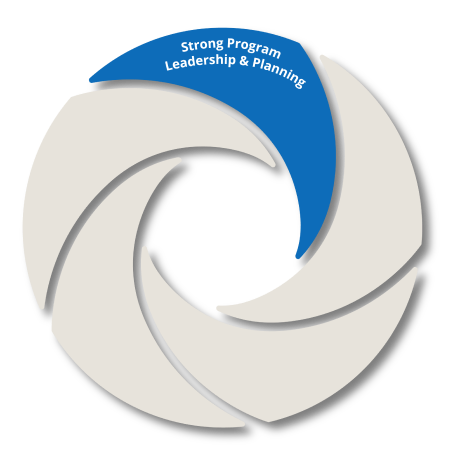District and Campus Commitments
These commitments describe the roles and responsibilities of the administrators who support, supervise, and manage the school counseling program staff.
- Administrators prioritize the convening of a steering committee to plan for and monitor implementation of the individual planning system and provide adequate time and support for steering committee members to conduct their roles and responsibilities.
- Administrators authorize one member of administration to participate in the steering committee and routinely coordinate with the certified professional school counselor(s) in the planning, implementation, and evaluation of a data-driven comprehensive school counseling program.
- Administrators participate in training on the effective implementation of a comprehensive school counseling program as required by TEC §21.054.
- Administrators include school counseling program leader(s) on district and campus leadership team(s) to ensure alignment of the counseling program and district/campus goals.
- Administrators ensure that counseling and advising are reflected in district and campus goals.
- Administrators ensure that effective advising services are well organized within the district's comprehensive school counseling program by participating in the development and approval of the organizational structures and processes of the individual planning system.
Essential Actions
These actions describe what the most effective school counseling program staff do to implement and continuously improve an individual planning system.
Key Practices:
- A steering committee convenes under the direction of a certified professional school counselor or administrator who will be responsible for the planning and monitoring of the individual planning system. The Effective Advising Steering Committee represents elementary and secondary levels and includes, but is not limited to, one certified professional school counselor, one administrator, a representative of career and technical education, and a representative of students from special populations such as the Transition and Employment Designee (TEC §29.0112).
- The Effective Advising Diagnostic Tool is completed on an annual basis to identify levers, essential actions, and key practices that will ensure fidelity of implementation and continuous improvement of the individual planning system.
- Student-level formative and summative metric data for all student populations is collected and disaggregated routinely to drive equitable practices. This data is shared with school counseling program staff and administrators to inform goal setting related to effective advising.
- The school counseling program staff regularly administers a needs assessment to all students and caregivers for the purpose of collecting, analyzing, and communicating data related to college, career, and military readiness.
Key Practices:
- Steering committee members:
- complete the Effective Advising Gap Analysis to identify any gaps in the district’s individual planning system.
- ensure developmentally appropriate grade level expectations are set for kindergarten through grade 12.
- identify metrics for each developmental domain to measure student progress toward grade level expectations.
- School counseling program staff:
- track the identified metrics for all students in the district and monitor students’ progress toward grade level expectations.
- use a multi-tiered system of student support to plan targeted and intensive interventions for students who are not on-track to meet grade level expectations.
- identify students in need of tier 2 and tier 3 interventions.
- develop a community resource guide for referrals to external partners who can provide intensive interventions for at-risk students in tier 3.
Key Practices:
- A certified school counselor is identified by the district as a leader to oversee the implementation of an individual planning system through the district’s comprehensive school counseling program.
- School counseling program staff have clear roles and responsibilities that are aligned to the components of a comprehensive school counseling program to support all students toward grade level expectations.
- School counseling program leader(s) coordinate with administrators to assess the master schedule and identify courses and curriculum that can be embedded to support advising services.
- School counseling program leader(s) and administrators identify teachers as internal partners in advising to implement advising curriculum into their classrooms to support students in making progress toward grade level expectations.
- The school counseling program staff has a clear communication plan for communicating news, updates, and outcomes to the school board, administrators, internal and external partners, and families.
Key Practices:
- A caseload management system is provided to support efficiency and efficacy of the individual planning system and to track the provision of equitable advising for all students toward grade level expectations.
- A tool is provided for monitoring the student metrics set within the individual planning system.
- School counseling program staff develop an asset map of tools and resources that align with grade level expectations and identify gaps in advising materials.
Key Practices:
- School counseling program leader(s) review the organizational structure of school counselors, advisors, and internal partners who are responsible for implementation of advising services and identify gaps in tier 1, tier 2, and tier 3 services that may hinder students from meeting grade level expectations.
- School counseling program leader(s) coordinate with administrators to identify funding sources and determine an annual budget for contracted services.
- External partners are vetted to ensure equitable, safe, and secure services will be provided to students.

